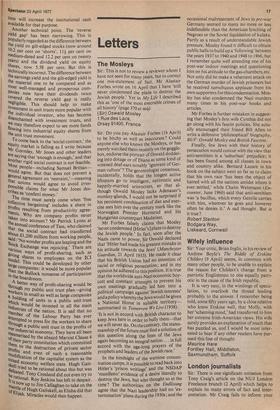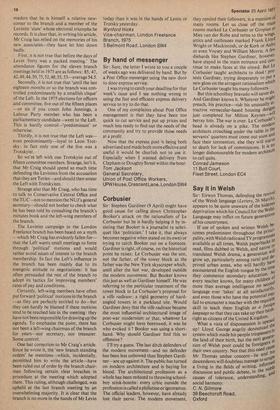London journalists
Sir: There is one significant omission from ' Tony Craig's article on the NUJ London Freelance branch (2 April) which helps to explain its many errors of fact and interpretation. Mr Craig fails to inform your readers that he is himself a relative newcomer to the branch and a member of the Levinite 'slate' whose electoral triumphs he records. It is clear that, in writing his article, Mr Craig has relied on the memories of his new associates—they have let him down badly.
First, it is not true that before the days of Levin 'forty was a packed meeting.' The attendance figures for the eleven branch meetings held in 1975 are as follows: 85, 47, 42, 49, 44, 50, 75, 52, 48,55, 53—average 54.5.
Secondly, it is not true that 'until the last eighteen months or so the branch was controlled predominantly by a smallish clique' of the Left. En the 1975 elections for officers and committee, five out of the fifteen places —or six if you count John Jennings, a Labour Party member who has been a parliamentary candidate—went to the Left. This is hardly control—'predominant' or otherwise.
Thirdly, it is not true that the Left was— even predominantly—loyal to Leon Trotsky: in fact only one of the five was a Trotskyist.
So we're left with one Trotskyist out of fifteen committee members. Strange, isn't it, that Mr Craig should spend so much time defending the Levinites from the accusation that they are Tories—and should then smear the Left with Trotskyism.
Strange also that Mr Craig, who has time to talk to Conservative Central Office and the TUC—not to mention the NUJ's general secretary—should not bother to check what he has been told by consulting the branch's minutes book and the left-wing members of the branch.
The Levinite campaign in the London Freelance branch has been based on a myth —which Mr Craig has evidently fallen for— that the Left wants small meetings to force through 'political' motions and would rather avoid issues of interest to the branch membership. In fact the Left's influence in the branch has been mainly due to its energetic attitude to negotiations: it has often persuaded the rest of the branch to adopt its tactics for improving members' rates of pay and conditions.
Certainly, left-wing members have often put forward 'political' motions in the branch —as they are perfectly entitled to do—but they can hardly be blamed if these motions tend to be reached late in the meeting: they have not been responsible for drawing up the agenda. To emphasise the point, there has not been a left-wing chairman of the branch for years—nor secretary, nor treasurer. Some control.



































 Previous page
Previous page